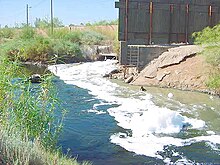
Back قضايا بيئية Arabic Ekoloji problemlər Azerbaijani पर्यावरणी मुद्दा Bihari Umweltproblem German Περιβαλλοντικά προβλήματα Greek Ingurumen arazo Basque مسائل زیستمحیطی Persian Ympäristöongelma Finnish Environmental issue GUR Abubuwan da suka shafi muhalli Hausa
The examples and perspective in this article may not represent a worldwide view of the subject. (March 2020) |

Environmental issues are disruptions in the usual function of ecosystems.[1] Further, these issues can be caused by humans (human impact on the environment)[2] or they can be natural. These issues are considered serious when the ecosystem cannot recover in the present situation, and catastrophic if the ecosystem is projected to certainly collapse.
Environmental protection is the practice of protecting the natural environment on the individual, organizational or governmental levels, for the benefit of both the environment and humans. Environmentalism is a social and environmental movement that addresses environmental issues through advocacy, legislation education, and activism.[3]
Environment destruction caused by humans is a global, ongoing problem.[4] Water pollution also cause problems to marine life.[5] Some scholars believe that the projected peak global population of roughly 9-10 billion people could live sustainably within the earth's ecosystems if humans worked to live sustainably within planetary boundaries.[6][7][8] The bulk of environmental impacts are caused by excessive consumption of industrial goods by the world's wealthiest populations.[9][10][11] The UN Environmental Program, in its "Making Peace With Nature" Report in 2021, found addressing key planetary crises, like pollution, climate change and biodiversity loss, was achievable if parties work to address the Sustainable Development Goals.[12]
- ^ Lim, Chi Hong; Lim, Bong Soon; Kim, A. Reum; Kim, Dong Uk; Seol, Jae Won; Pi, Jeong Hoon; Lee, Hansol; Lee, Chang Seok (2022). "Climate change adaptation through ecological restoration". Natural Resources Conservation and Advances for Sustainability. pp. 151–172. doi:10.1016/B978-0-12-822976-7.00013-2. ISBN 978-0-12-822976-7.
- ^ "Human Impacts on the Environment". education.nationalgeographic.org. Retrieved 2023-05-06.
- ^ Eccleston, Charles H.; March, Frederic (2010). "Environmental management systems". Global Environmental Policy. pp. 219–254. doi:10.1201/b17375-14. ISBN 978-0-429-11186-0.
- ^ McNeill, Z. Zane (2022-09-07). "Humans Destroying Ecosystems: How to Measure Our Impact on the Environment". Retrieved 2023-05-06.
- ^ "Marine Pollution". education.nationalgeographic.org. Retrieved 2023-05-06.
- ^ Alberro, Heather (28 January 2020). "Why we should be wary of blaming 'overpopulation' for the climate crisis". The Conversation. Retrieved 2020-12-31.
- ^ "David Attenborough's claim that humans have overrun the planet is his most popular comment". www.newstatesman.com. 4 November 2020. Retrieved 2021-08-03.
- ^ "Dominic Lawson: The population timebomb is a myth The doom-sayers are becoming more fashionable just as experts are coming to the view it has all been one giant false alarm". The Independent. UK. 18 January 2011. Retrieved 30 November 2011.
- ^ Nässén, Jonas; Andersson, David; Larsson, Jörgen; Holmberg, John (June 2015). "Explaining the Variation in Greenhouse Gas Emissions Between Households: Socioeconomic, Motivational, and Physical Factors". Journal of Industrial Ecology. 19 (3): 480–489. Bibcode:2015JInEc..19..480N. doi:10.1111/jiec.12168.
- ^ Moser, Stephanie; Kleinhückelkotten, Silke (July 2018). "Good Intents, but Low Impacts: Diverging Importance of Motivational and Socioeconomic Determinants Explaining Pro-Environmental Behavior, Energy Use, and Carbon Footprint". Environment and Behavior. 50 (6): 626–656. Bibcode:2018EnvBe..50..626M. doi:10.1177/0013916517710685.
- ^ Lynch, Michael J.; Long, Michael A.; Stretesky, Paul B.; Barrett, Kimberly L. (August 2019). "Measuring the Ecological Impact of the Wealthy: Excessive Consumption, Ecological Disorganization, Green Crime, and Justice". Social Currents. 6 (4): 377–395. doi:10.1177/2329496519847491.
- ^ "Making Peace With Nature". UNEP - UN Environment Programme. 11 February 2021.